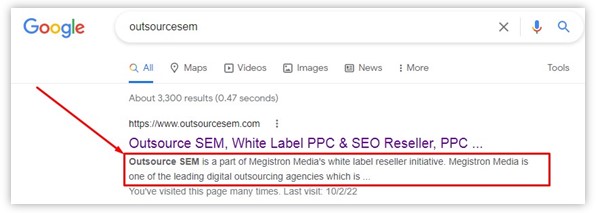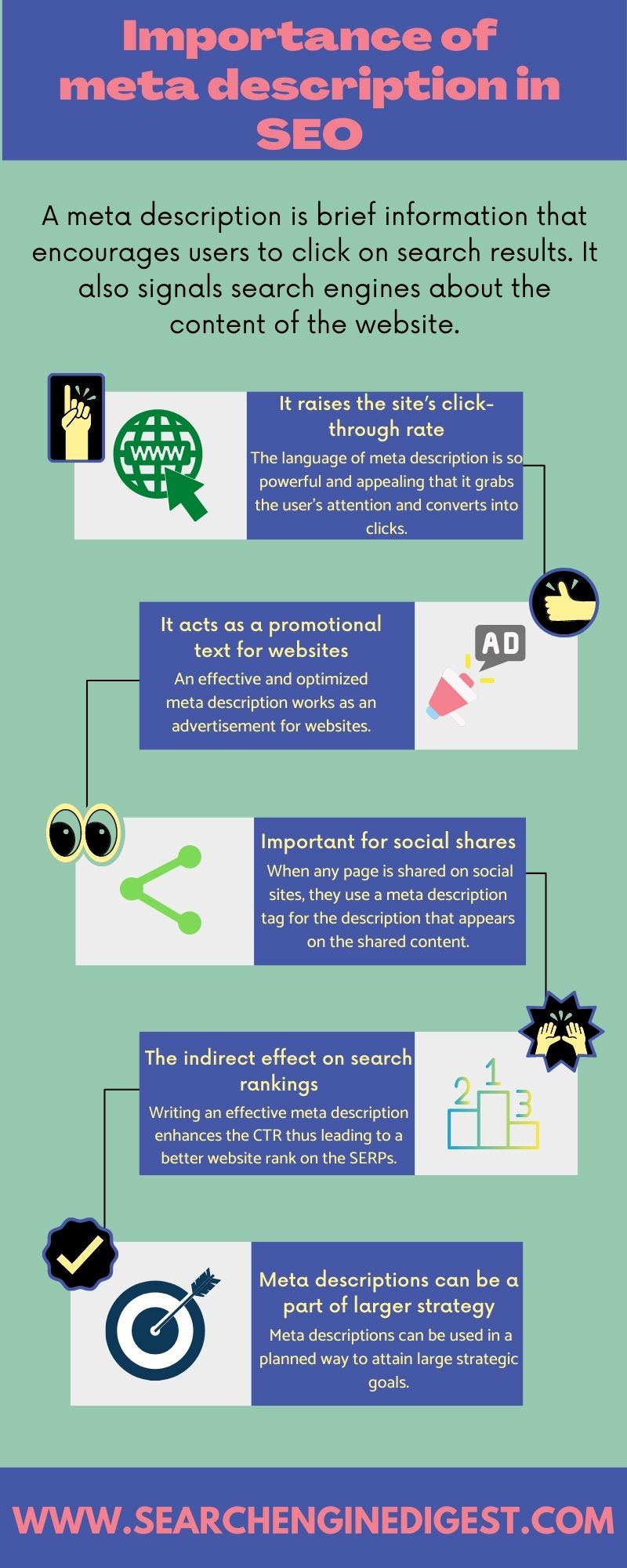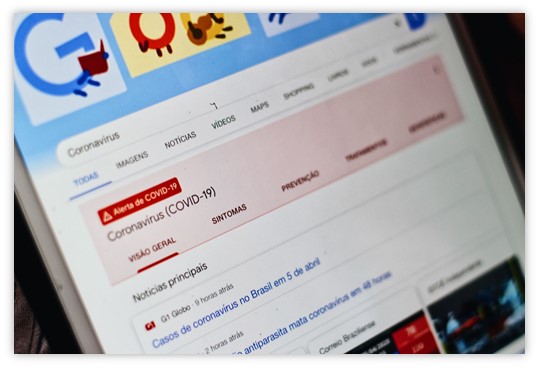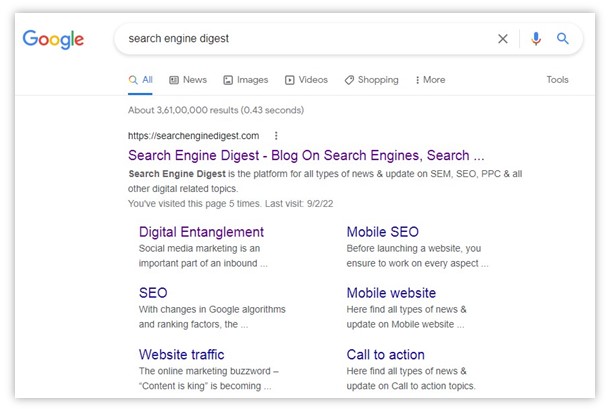In the digital marketing world, there are rapid enhancements in the marketing trends, including PPC trends, SEO trends, etc., so describing your business offerings on the SERPs becomes quite critical.
The meta description tag in your HTML code summarizes the content of the webpage in less than 160 characters. It gives a brief introduction to users and search engines about what they’ll find if they click through your site. Generally, meta descriptions do not have a direct effect on SEO rankings but it is essential to raise clickthrough rate (CTR) and act as an organic-ad text. In this blog, we’ll discuss what a meta description is? Importance of meta description in SEO rankings and how to write a perfect meta description for your website. So let’s start it out.
What is a meta description?
The meta description is brief information of any webpage that appears on the SEPRs. It encourages the audience to click on that result if the description matches their search intent. We don’t exactly consider meta descriptions as a ranking factor but it works as a conversion factor. Compelling meta description converts users into customers to meet the business’s specific goals. The meta description length is 160 characters, including spaces, so keeping it between 140~155 characters is the best practice. This snippet of text appears under the title of your website in search engine result pages.

You can find a meta description of any web page by right-clicking on that page > click ‘view source’ or ‘view page source’; it looks like this:

A good meta description has the power to increase the organic click-through rate and drive more relevant traffic to your page. Thus, it acts as a mini-promotional for a web page and is as essential as ad-text.
Importance of meta description in SEO
A compelling meta description increases the chance of visitors clicking your website on the SERPs. In past times, malpractices like keyword stuffing were frequently used in the meta description tag to gain an unfair ranking advantage. Therefore, Google made certain changes in its algorithm and clarified that meta descriptions have no direct effect on SEO rankings but it still plays a significant role in on-page optimization. Now, let’s explore the importance of click-worthy meta description:

- It raises the site’s click-through rate – Meta descriptions can help drive clicks and traffic to the website. Several studies claim a well-written and optimized meta description increases the website CTR. The language of meta description is so powerful and appealing that it grabs the user’s attention and converts into clicks.
There are three main features in a SERP result: the page title, URL and page description. All are responsible for a user’s decision to click through but meta description contains the most words out of these three. It has more information about the website’s content. Thus, it plays a vital role in the user’s click-through action.
- It acts as a promotional text for websites – Promotions are done to grab the user’s attention. Similarly, an effective and optimized meta description with a proper call to action works as a promotional text for websites. It describes to users what type of content they’ll get if they explore this site. An eye-catching meta description increases the organic click-through rate, brings users’ to your site, enhances user experience, etc. It acts as a mini-ad for a web page, so meta descriptions work well as important promotional texts.
- Important for social shares – Social sharing sites play a vital role in driving traffic to our website. When any page is shared on these online platforms, they use a meta description tag for the description that appears on the shared content. Social sharing sites may just use the first text they can find without any meta description tag. It might not be relevant to our content and users get distracted by it. We lose a significant amount of traffic that comes through social sites. So, it is strongly recommended to write a meta description for every website page.
- The indirect effect on search rankings – In the above sections, we’ve learned that the meta description tag is not responsible for the SEO rankings but that doesn’t mean it has nothing to do with it. This is good to know that SEO meta description indirectly affects search engine results. Writing an eye-catching meta description enhances the click-through rate(as it is an SEO metric for rank), thus leading to a better website ranking on the SERPs.

- Meta descriptions can be a part of a larger strategy – As meta description is a part of meta tag, it describes the page’s content, helps attract readers from search result pages, increases rankings, and draws traffic from the social media platforms, etc. But this is not the last; meta descriptions can be used in a planned way to attain significant strategic marketing goals.
Search engines are not limited to displaying only the page title, the page URL and the page description. There are various things like some data, extra links, icons, reviews, images, etc., that can be generally found for pages with product information, recipes, and reviews. As we can see in the image below:
Optimizing your meta description according to such rich snippets is one of the best practices to improve your website’s SEO ranking, which further enhances the performance of a page in search results.
How to write a perfect SEO meta description?
So far, we’ve learned what meta description is and the importance of meta description. Now, we look at how to write a relevant and appealing SEO meta description that helps in SEO rankings. Also, consider some of the popular site’s meta descriptions as an example. Let’s start:
- Use targeted keywords – Do some keyword research and select the most relevant one that describes your content best. Use them in your meta description tag and encourage searchers to click on that result. When users of the web are looking for a result with your targeted keyword, Google SEO will show these relevant keywords in bold. So, using targeted keywords in your meta description helps grab users’ attention and raise your website’s click-through rate.
- Use Call-to-action (CTA) – Phrases used in meta description tags like ‘Learn more’, ‘Read more’, ‘Click here to know more’, ‘Shop now’ etc., are called call-to-action. Using a call to action in your meta description is a great and effective way to compel people to click on your website. It helps users know what they’ll expect if they click on your site.
This is generally used to sell a product, email sign up, direct users to the website or any social media pages.
- Defined meta description look better in search results – As discussed earlier, meta descriptions contain the most words and information among page titles and URLs. Therefore, try to write a defined and simple meta description that makes sense and delivers clear information about the page’s content. When the audience reads a meta description, they should be able to clearly understand what is the content on the web page and whether it matches their search intent, only then can they decide whether the result is worth clicking.

- The language should be influencing – The SEO meta description must have an answer to a question that why should a user click on it? These benefits and urgency should be reflected in the meta description. The power is in the language that converts a web user into a customer to achieve the website’s specific goal. You should consider including words like ‘learn’, ‘read’, ‘watch’ appropriately that define your content.
As you know, the meta description tag consists of keywords, phrases, CTA and other relevant information. All these points should be used in such a manner that it has a flow in reading and looks smooth.
- Meta description length – The maximum character limit for meta description tag is 160(with spaces) but it is good practice to keep it in between 135~115.
Going beyond this limit will shorten the meta description in search results by Google or any other search engines. It may not go in your favor and is unclear to understand for visitors. So, try to keep your meta description length in the range provided.
Mistakes to avoid while writing the meta description
There are some common mistakes people do not care about while writing meta descriptions but this affects their click-through rate. Thus, below is the list of some common mistakes to consider and avoid repeating it in your meta description tag to make it effective:
- Do not duplicate meta description – Meta description tag helps in indexing in search results. You can get high SEO rankings but this doesn’t work if you use duplicate descriptions on your page. It is essential to write a unique meta description for each of your pages so that search engines can understand the page’s content and how it differs from other sites. If you write the same description for each page, both the users and the search engines will not understand each page’s intent. This will also result in indexing penalties as the crawler cannot understand which page is original. You can use the Screaming Frog and Copyscape to avoid writing a duplicate meta description.

- Avoid keyword stuffing – Keyword stuffing is one of the webspam or spam indexing in which keywords are unfairly stuffed in webpage’s content, meta tags, etc., in order to gain a ranking advantage in the search engine results.
Therefore, do not use this malpractice and avoid putting keywords in your meta description tag as it will negatively affect your website.
- Avoid using quotation marks – A meta description is the part of the meta tag that is in HTML language. So, you have to be careful not to include any character that breaks the HTML language. Double quotation marks (“example”) is the character that commonly causes problems; therefore, it is advised not to use this quotation mark in your meta tag. If it is necessary to use a quotation, try using single quotation marks like ‘example’, ‘marketing’, etc.
- Do not over-promise and under-deliver – No doubt that your meta description should be unique and exciting. Its writing style and language should be adequate. That’s why you can use phrases like “shocking”, “life-changing”, “popular”, “hilarious” etc., to grab users’ attention. But, do not over-promise or overexpress your meta description. It is not a situation like over-promising and under-delivering. There is always coordination between what you write in your description and what you deliver.
Examples of some great meta description tag
There are examples of some meta descriptions that are best in their category. First, take a look at the Google meta description:

Here, the meta description length is 159 characters (including spaces); this is how it is displayed in search engines.
This is the example of Search Engine Digest, a digital marketing blog website.

This meta description tag quickly and efficiently tells everything you need to know. The meta description length is 127 characters and none of the words are cut off in search results. Also, in the image below, you can see there is a description for each page.

Closing thoughts
As a part of the meta tag, Meta description is essential in on-page SEO and enhancing user experience. It is included as a snippet in search results. Pages with SEO meta descriptions get an average of 5.8% more clicks than pages without. Therefore, writing a unique description for each page is highly recommended. It is not good as there may be text cut-off, essential details missing, irrelevant page data appearing, etc.; thus, it is better to write by yourselves. Even if you do not tell search engines and social media platforms which page description to use, they choose it themselves.
Meta descriptions can be short and sometimes longer, depending on the requirement. This helps to choose the best description for your page. You can experiment with your meta description, write two or more descriptions for your page and use it for a few weeks, then refer to Google Analytics to know which one works best for you.
Writing a unique description for every page, blog, product, etc., is crucial to appear on Google SEO rankings.
References
-
306, 2024Understanding Google’s preference for crawling high-quality content
Crawling websites is [...]
-
2905, 2024All you should know about third-party cookies by Google
Cookies have revolutionized [...]
-
2405, 2024Helpful content update by Google to enhance website ranking
Google launched a [...]





Leave A Comment